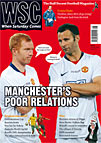 Dear WSC
Dear WSC
For a major international tournament junkie like myself, summers in the odd-numbered years are the worst of times. As such, no amount of luxury on my holidays can ease the pain of the absence of a World Cup or European Championship finals. Even allowing for Scotland’s continued inability to connect with the 21st century, I miss, nay need, a big summer football event. A mid-life crisis only makes matters worse whereby I’m forced to accept an ever-increasing gap between myself and those much younger (and of course fitter) men I choose to cheer on. Surely I’m not alone in this respect – there must be thousands of similar sad old gits out there. My solution – a biennial seniors tournament featuring players aged 40-plus. I’m talking about a chance to see superstars from yesteryear such as Dalglish, Keegan, Platini, Maradona and others who are nearer to my age group. Restrict the tournament to 16 nations with the hosts being countries unlikely to ever stage the big events such as Norway/Denmark, Wales/Ireland, Canada, Cuba. All profits to charity, a boost to local economies and a chance to travel the world with a purpose. Someone hear my plea!
Robert Marshall, Cambuslang
Search: 'Get With The Programme'
Stories
 Barcelona turn up with barely a first-teamer in their ranks, Celtic show off a new away shirt, Spurs struggle in their latest kit abomination, while Al-Ahly make up the numbers. Taylor Parkes welcomes you to the Wembley Cup, summer's latest soporific pre-season tournament
Barcelona turn up with barely a first-teamer in their ranks, Celtic show off a new away shirt, Spurs struggle in their latest kit abomination, while Al-Ahly make up the numbers. Taylor Parkes welcomes you to the Wembley Cup, summer's latest soporific pre-season tournament
The English summer: airless buses, flies in the wheelie-bin and pre-season tournaments we'll never, ever forget. It's that time of year again (this morning was so summery, a hailstorm set off all the car alarms down my street), so it's off to the Wembley Cup, a star-studded spectacular in the grand tradition of the Araldite Trophy, the Dr Pepper World Shield and the All-England Esso Bauble, or whatever the hell they were called.
 Is football in Britain any less corrupt than in other countries?
Is football in Britain any less corrupt than in other countries?
Some football clubs are immune from the global recession. One is Real Madrid who seem to be set on buying up the best players from the main Champions League rivals, another is Manchester City who are apparently prepared to pay Samuel Eto’o a basic £250,000 per week. If Eto’o’s potential employers can afford that sort of salary is of course entirely their business, although it might also be reasonable to wonder just how much money anyone needs to earn. In view of the huge amount of money sloshing about in the sport, you could also wonder why anyone would feel compelled to top up a handsome salary with extra undeclared income. The answer might be that they do it because they can.
 On the 40th anniversary of the “football war” Jonathan Barker asks if a World Cup play-off really led to armed conflict
On the 40th anniversary of the “football war” Jonathan Barker asks if a World Cup play-off really led to armed conflict
On December 29, 1968, Honduras, widely regarded one as of the lesser lights of Central American football, caused a major surprise in the 1970 World Cup eliminators by overcoming a Costa Rica side that had been favoured to qualify for Mexico. Their opponents in the next round would be neighbouring El Salvador. Seemingly of little interest to the outside world, the three games the countries played in June 1969 would become the focal point of simmering tensions between the two governments, with the subsequent conflict coming to be known, however misleadingly, as the “football war”.
 Owen Amos reports on how the FA Vase provides an opportunity for smaller clubs to have their moment in the Wembley sun
Owen Amos reports on how the FA Vase provides an opportunity for smaller clubs to have their moment in the Wembley sun
To understand to whom the FA Vase matters, look at the list of winners. Since 1974-75, the Vase’s first season, 20 of the winners have been suffixed “Town”: from Brigg and Bridlington, to Whitby and Wimborne. By contrast, just two winners – Truro and Winchester – have been Cities.